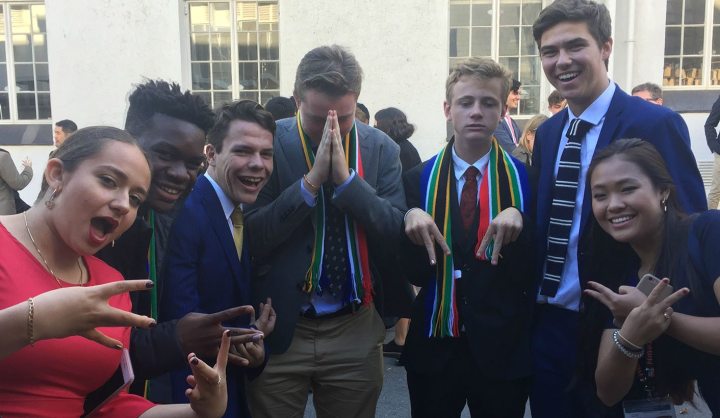Debating and Public Speaking Championships
Pupils lob word bombs on privilege and patriarchy

Dismantle patriarchy, solve the world’s political woes, and learn how to parent teenage boys properly – all during one afternoon at the World Individual Debating and Public Speaking Championships. Competitors hail from the most elite private schools around the globe, but as they take the stage they are prepared to confront – and make fun of – the systematic inequalities they represent.
“Welcome to the 81st annual straight white male convention,” began John van Niekerk, a matric pupil from Bishops in Cape Town. Standing on his high school’s stage, he lamented:
“We used to have all the money and the land. And we still do – it’s just not as fun any more!”
Laughter erupted from the crowd, but Van Niekerk’s composure remained firm – not because he didn’t think what he was saying was funny, but quite the opposite: he knew it was, and wanted to score as many points as possible from the judges who sat in the front row, marking him for speech structure, deliverance, and humour.
Van Niekerk was one of the two finalists in the after-dinner speech category of the World Individual Debating and Public Speaking Championships (WIDPSC), an annual international public speaking competition hosted this past weekend in Cape Town. High school pupils from Canada, the United States, Hong Kong, England, Cyprus, India, South Korea, Lithuania, Australia and South Africa gathered to compete for championship titles in their specialist categories.
One by one, pupils took the stage to deliver persuasive speeches, interpretative readings, debates, impromptu addresses, and finally the famed after-dinner speech, where competitors evoke laughter from the crowd through nuanced examinations of world issues. This time, that issue was “heteronormative patriarchy”. And Van Niekerk, a blond young white man representing one of South Africa’s most exclusive all-boys private schools, was all too ready to make fun of it.
The complex humour in Van Niekerk’s speech was matched by the depth of a fellow competitor’s speech on “the loss of leisure” and the thoughtful reasoning of a team of two debaters arguing for a requisite number of volunteer work years for anyone running for president. Their deliverance was always sharp and analysis consistently sophisticated.
To qualify for this championship, pupils have climbed through the ranks of competitive national competitions. Most of the pupils come from exclusive private schools in their home countries, and the high-brow education of competitors is evident. These teenagers’ usual uniform of takkies and jeans have been exchanged for shiny leather shoes and well-tailored blazers, their conversations sprinkled with words like “discourse” and phrases like “ferment an argumentation”.
But while each speech was refined and each delivery polished, the competition’s environment was one of unpretentious camaraderie. As pupils took their seats, Americans reached over the rows to give high fives and fist bumps to the South African team.
“Aussie Aussie Aussie, oi oi oi!” chanted the Australian delegation as one of their own stood up to take the stage.
Jessica Zheng, an 18-year-old competitor representing Branksome Hall in Toronto, Canada, explained that the community she has built from public speaking has given her a global network of friends. As she nears her own high school graduation, she credits public speaking with helping her develop essential skills that she draws on professionally and socially.
For Zheng, public speaking is more than a school extracurricular or a university application booster – it’s a community full of lessons and friendship all on its own. After an Australian friend ended his speech, she turned to his teammates behind her and exclaimed, “He’s your national treasure!”
Simon Peile, the chair of the Council at Bishops and parent of one of this year’s competitors, explained that the competition provides students with a place to develop professional skills essential to contemporary politics.
“Public speaking forces you to listen to other people’s arguments,” he said.
For Peile, this skill feels especially relevant in South Africa right now.
“It’s a way to combat the violence so commonly associated with our political system.”
He said Bishops was very supportive of its public speaking club – and the competitive edge that it gives its matrics when they apply for university.
“All of the last five or six chairmen of Bishops’ public speaking society have gone to Ivy league schools,” said Peile.
Grace Nolan, a public speaking coach and teacher from The York School in Toronto, explained that the competitive and financial requirements of international public speaking tournaments can pose a barrier to pupils who don’t go to private schools.
“Not all schools can support an extra-curricular public speaking club,” she said. “There’s also the cost of flying to international competitions which can be very expensive.”
The competition provides an optimistic insight into the kind of leadership that pupils from the world’s poshest schools will use to guide the global future. These young leaders pointed out the flaws in elitist institutions and reprimanded older generations’ parenting mistakes. Through self-deprecating humour and razor-sharp arguments, they made fun of male fragility and argued for political representation of the working class. In their speeches lies hope that the elite of the future will be thoughtful, informed, and shamelessly funny.
As Van Niekerk told the crowd: “Let’s take a step back and colonise… I mean compromise!” DM
Rebecca Redelmeier is on a study abroad programme with Round Earth Media.

















 Become an Insider
Become an Insider